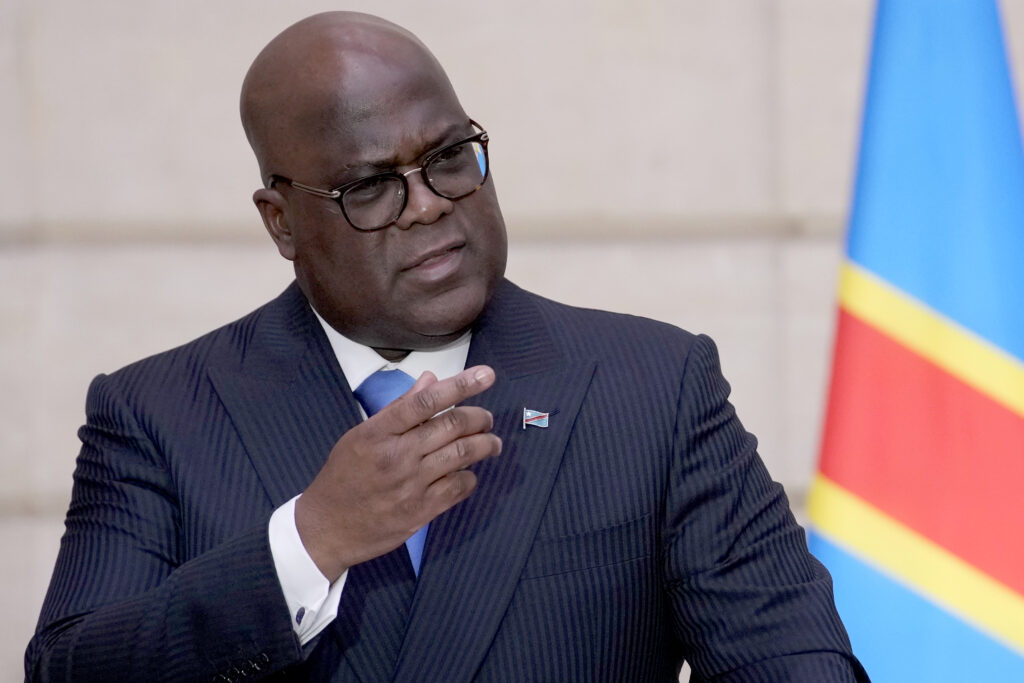Congolese President Felix Tshisekedi is only a year into his second and in theory final term in office but appears to be paving the way for constitutional reform.The suspected overhaul, according to the opposition, is clearly aimed at ensuring the Democratic Republic of Congo’s leader stays in power.Tshisekedi, who easily won December 2023 elections for another five-year term, has kept his plans vague for the time being.But many are asking whether he envisages a constitutional reform, or even the adoption of an outright new text.During visits to several towns in recent weeks, he has spoken of the need for a “constitution adapted to the realities” of the country, which gained independence from Belgium in 1960.The current text was “drawn up abroad and by foreigners” and is now “outdated”, he said, announcing a national commission to be set up to decide on the matter from next year.”Nothing is forbidden, revision or a constitutional change,” said law professor Auguste Mampuya, who helped draw up the current DRC constitution, adopted by referendum in 2005.”What are the constitutional provisions that are not in tune with reality? What realities is he talking about?” pondered Mampuya.”The motivations are not clear so there is suspicion.”- Referendum -Until now, Tshisekedi has suggested that any change or reform would go to a referendum.The current text already lays out conditions for any revisions — changes must be approved by a referendum called by the president, unless the proposed change is backed by three-fifths of MPs.An alliance of parties called the Sacred Alliance that supports Tshisekedi has an overwhelming majority in parliament.There’s no provision currently for the adoption of a new constitution.The opposition, which warns of a “constitutional coup d’etat”, claims Tshisekedi wants to grab a third mandate and overturn the current limit of two five-year presidential terms.Opponents led by Tshisekedi’s main rivals in last year’s presidential election have vowed “citizen demonstrations across the whole country”.The president has dismissed the claims, telling several thousand supporters at a meeting late October to be wary of an opposition “which has nothing to offer”.”Who has spoken to them of a third mandate?” Tshisekedi said.- Locked-in provisions -The constitution was already revised by parliamentarians in 2011. The so-called locked-in articles which in theory cannot be revised — including on the number and length of presidential terms — were not changed.Four years later, a proposed electoral law change, which would have allowed former president Joseph Kabila to stay in office beyond two terms, sparked demonstrations.The protests turned into riots and pillaging and left dozens dead.Supporters of Tshisekedi believe Kabila failed in his attempt because he left it too late to unite support around him, observers say.”Tshisekedi has chosen to launch a ‘debate of attrition’,” political analyst Christian Moleka said.”He wants to push his allies to decide very early on to stay in power alongside him for at least another four years, or to make the suicidal choice to rally a weakened opposition after the presidential vote,” he added.- State of siege -The constitution precludes revisions during a state of war, a state of emergency or a state of siege.Since 2021, two eastern provinces, North Kivu and Ituri, both plagued by conflict for around three decades, have been placed under a state of siege.Prime Minister Judith Suminwa Tuluka travelled at the end of last month to Goma, the capital of North Kivu which is almost surrounded by Rwanda-backed M23 rebels, who have seized swathes of eastern DRC in fighting with the Congolese army.The purpose of the visit by Tuluka, who is due to present the upshot of the trip soon, was to assess whether the state of siege should be maintained in the region.
